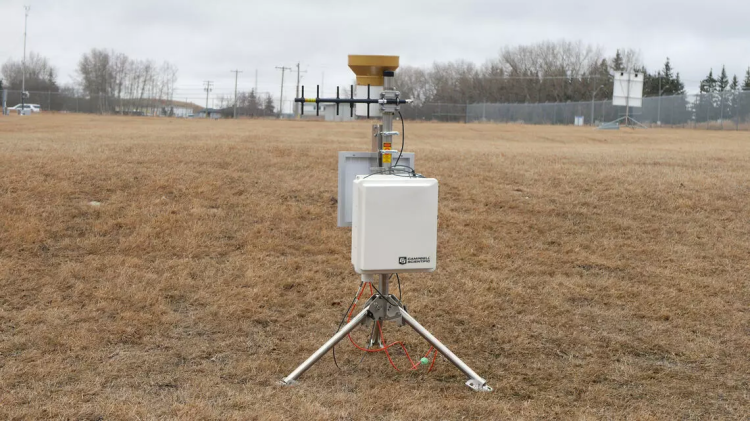The agricultural sector is witnessing a transformative era, driven by technological innovations designed to tackle age-old challenges. At the University of Calgary, transformative research is advancing the way we understand animal behaviour, manage water resources, and implement sustainable practices. Several pivotal projects are occurring right now that highlight how cutting-edge technology is shaping agriculture and policy.
Exploring bull behaviour and health monitoring
At the Faculty of Veterinary Medicine (UCVM) a team led by PhD. candidate Dr. Vinicius Camargo, DVM, with his supervisors Dr. Jennifer Pearson, DVM, PhD, DACT, and Dr. Ed Pajor, PhD, Anderson-Chisholm Chair in Animal Care and Welfare and director of W.A. Ranches, has been pioneering livestock management. Over the past four years, the team's research at W.A. Ranches has employed remote monitoring technologies to study beef bull behaviour and its implications for reproductive success and health. Using video surveillance, direct observation, and collars equipped with GPS, accelerometers, and proximity sensors, the team has developed machine-learning algorithms to decode bull behaviours.
These innovations have unveiled fascinating correlations between bull activity and reproductive performance. Active and socially engaged bulls during pre-breeding periods sired significantly more calves. Furthermore, the technology allowed for the detection of health issues such as lameness earlier than normal, resulting in quicker treatment. Such findings underscore the potential of these technologies in identifying health issues remotely.
The implications extend beyond bulls. Killam Postdoctoral Laureate, and Pajor lab member, Dr. Rachael Coon, Ph.D., has adapted similar, calf sized collars, to monitor calves, enabling early detection of diseases. By tracking activity levels and mother-calf proximity, the system flags abnormalities in behaviour. This approach not only enhances animal welfare but also supports ranchers in large-scale operations.
While ranchers have eyes on their animals daily, a detailed look at each individual animal every day is not feasible. By establishing a baseline of behavioural determinants of health, as well as abnormalities, that data could be inputted into software programs that would flag such concerns.
Software programs like Telus Animal Record Management, already in use at W.A. Ranches, already collect significant amounts of data on a wide variety of production and health variables. In the future it is possible that such programs could be used to remotely monitor animals and update ranchers in live time via their cell phones if there is a deviation from that animal's normal behaviour, providing an early indication of ill health in advance of more obvious symptoms. This allows timely interventions that can reduce the reliance on medications and antibiotics, lowering production prices for producers, and thus purchasing prices for consumers.
Advancing hydrological forecasting through soil moisture monitoring
In parallel, another team, led by Dr. Alain Pietroniro, a professor in civil engineering at the Schulich School of Engineering, and Canada Research Chair in sustainable water systems, are making strides in hydrological forecasting by focusing on soil moisture; a critical yet challenging variable to measure. Soil moisture dictates how watersheds respond to precipitation, influencing everything from flood risks to agricultural irrigation decisions.

A soil moisture mesonet deployed at W.A. Ranches. Each station will be equipped with a data logger, a tipping-bucket rain gauge, and a SoilVUE10 TDR soil moisture sensor able to measure at six depths from 5-50cm. Photo Credit: Terri Whitehead
The development of a Soil Moisture Mesonet at W.A. Ranches exemplifies this initiative. A mesonet is a system of automated weather and environmental monitoring stations, specially designed to target micro-climates. By combining in-situ measurements, satellite data, and Earth system models, this network aims to refine predictions of floods, droughts, and water availability.
The mesonet addresses current limitations by integrating precise, localized measurements with broader satellite observations. Such data feeds into predictive models, improving accuracy and supporting water resource planning.
Digitization in agriculture: enhancing impact
Complementing these research efforts, UCalgary's Simpson Centre is advancing the integration of digital tools to minimize the water footprint of food production through the Alberta Digitalization Agriculture (ABDIAG) program, funded by the Government of Alberta. At the Simpson Centre, a team led by Dr. Juhi Huda, Ph.D. with Roshanne Sihota, M.A., and supervised by Dr. Guillaume Lhermie, DVM., director of the Simpson Centre, organized a policy lab that creates a collaborative platform to align stakeholders, focusing on practical solutions that complement innovations at W.A. Ranches.
This initiative emphasizes leveraging digital technologies such as sensors, satellites, and data analysis for improved farming practices, particularly in water sustainability. By bringing together producers, researchers, and policymakers, these discussions ensure that groundbreaking research and technological advancements translate into actionable strategies, enhancing agricultural management and sustainability.
Dr. Lhermie says, "while running the policy labs, we came rapidly to realize that each stakeholder cares deeply about water, with an idiosyncratic relationship to its usage and conservation. This represents a major challenge, as we need to develop precision policies', yet with a generic regulatory framework."
Dr. Pajor agrees with him. "There is no question that Precision Livestock Technology, which involves remote sensing, AI, and large data sets is the future of animal management. UCVM and other faculties are providing great leadership in developing these approaches for the cow calf sector of the beef industry at W.A. Ranches at the University of Calgary."
Driving a sustainable future
UCalgary is setting benchmarks for how technology can revolutionize agriculture. From improving livestock health to optimizing water management, these initiatives not only enhance productivity but also support environmental sustainability. As the global population grows and climate challenges intensify, such forward-thinking research is more crucial than ever.
To learn more about how UCalgary is shaping the future of agriculture, join the university's Creating Tomorrow series on April 12, in collaboration with the Calgary Stampede. This event will showcase the university's innovative approaches to transforming agriculture and food production.













